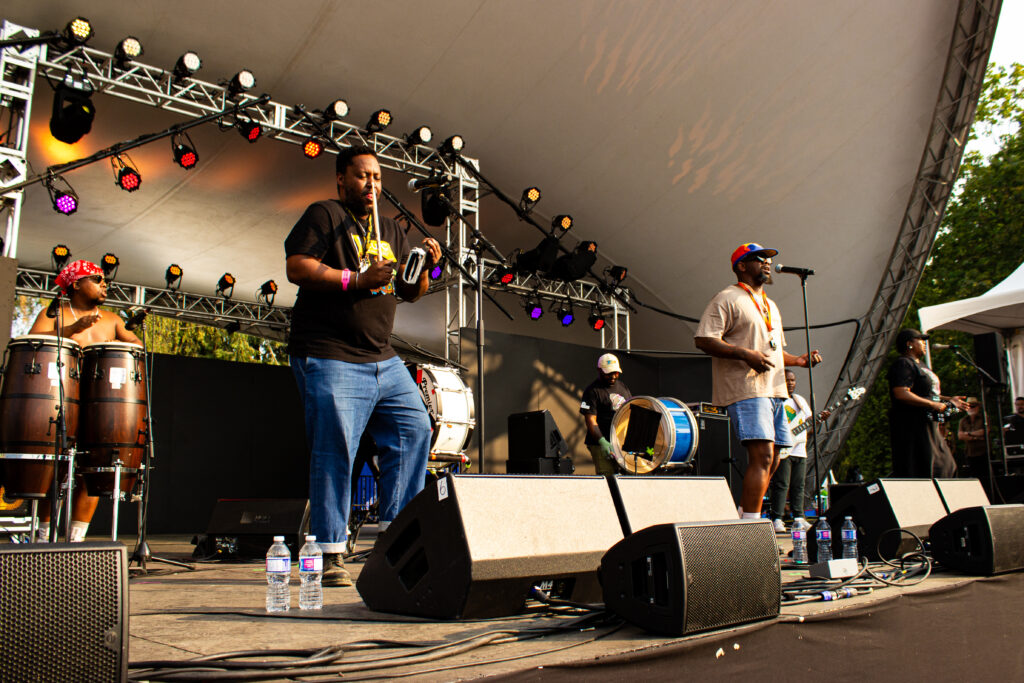By: Petra Chase, Editor-in-Chief
I have fond memories of long days spent at Vancouver Folk Festivals at ʔəy̓alməxʷ (Halkomelem), Iy̓álmexw (Squamish), or Jericho Lands. Perusing eclectic public vendors beyond the gates as music trickled from the stages and bunnies pranced always made me feel connected to the festival even without a ticket in. On July 21, I attended the final day of the three-day event going on its 47th year, and saw why the turnout is always in the tens of thousands, not to mention run entirely by a dedicated volunteer base.
This year’s lineup brought traditional and contemporary acts from near and far. While I had a few on my radar, I was more than ready to discover new artists. The main evening show demonstrated just how wide of a net folk and roots can cast, with all of them brought together by the deep level of musical connection.

South African group BCUC (standing for Bantu Continua Uhuru Consciousness) entranced everyone with their percussive-synched choruses and energetic rhythms. Taking inspiration from ‘70s Afro-Jazz and Afro-Psychedelic, the seven-member ensemble sees their music as “a weapon of political and spiritual liberation.”
I also enjoyed Pharis and Jason Romero, a duo from Horsefly, BC. Their time on stage felt like an expected folk experience with yodelling, anecdotes about living in the Cariboo mountains, animal fable songs, and fiddle and handmade banjos front and centre. I found myself drifting away to the harmonies and gentle string picking in their ‘70s-esque love song, “Souvenir.”
What better place to enjoy such raw performances than by one of the best local beaches, overlooking mountains? The festival fields, a sea of draped floral and boho fabrics, had a crowd area divided into separate dancing and sitting sections. People of all ages seemed to be feeding energy back to the stage.
Vancouver local Dawn Pemberton brought the soul out of the crowd with her renditions of some funk and gospel classics as well as her own songs. With a new album in the works, Supernova, you’ll likely find the vocalist, choir director, and music teacher performing at local soul and R&B scenes.
With quaint patches of wetland surrounding the path, folk fest also had food trucks, music-themed workshops, and local artisans to explore while travelling from stage to stage.
The final two performances were the ones I was most anticipating. Katie Tupper, an up-and-coming neo-soul singer-songwriter from Saskatchewan, is easy on the ears. Her voice was even more toned and smooth live singing her groovy, sultry singles like “She Said” and “Live Inside.”
A fitting finale, Jeremy Dutcher’s classically-trained voice was a force in the performance that sent the festival off into the night. Dutcher is a Wolastoqiyik (Maliseet) ethno-musician from “Tobique First Nation in north-west New Brunswick.” He writes music in his traditional Indigenous language of Wolastoqiyik. His performances always feature archival recordings of traditional songs and speaking from his Ancestors, and he makes sure to teach the crowd words in Wolastoqiyik. Speaking on the importance of music for connection, his message resounded as the sky turned black.
Some crowd members had attended the debut festival at Stanley Park back in 1977. Having taken it in for myself, I can see why many folk fest attendees make the weekend a late-July tradition.